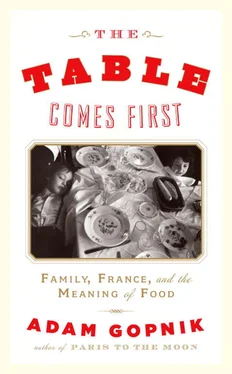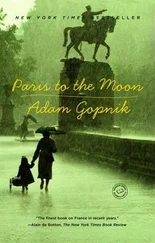The cookbooks of the confessional turn suggest that we are all in this together; cookbooks of the grammatical turn assume that you don’t know how to do the simple things, but that the simple things, once mastered, will enable you to do it all. Bittman assumes that you have no idea how to chop an onion or boil a potato, much less how chopping differs from slicing or dicing. Each basic step is tenderly detailed. How to Boil Water: “Put water in a pot (usually to about two-thirds full), and turn the heat to high.” How to Slice with a Knife: “You still press down, just with a little more precision, and cut into thick or thin slices of fairly uniform size.” To sauté: “Put a large skillet on the stove and add the butter or oil. Turn the heat to medium-high. When the butter bubbles or the oil shimmers, add the food you want to sauté.” Measuring dry ingredients, you are told to “scoop them up or use a spoon to put them in the cup.” And that “much of cooking is about heat.”
This all feels masculine in tone—not too many pretty side drawings, a car manual’s systematic progression from recipe to recipe—and seems written with an eye to male readers who are either starting to cook for friends or are just married and learning that if you don’t cook she’s not about to. The old New Basics , one recalls nostalgically, was exclamatory and feminine. “The celebration continues,” reads a blurb, and inside the authors “indulge” and “savor” and “delight”; a warm chicken salad is “perfection when dressed in even more lemon,” another chicken salad is “lush and abundant.” The authors’ perpetual “we” (“We like all our holidays accompanied with a bit of the bubbly”), though meant, in part, to suggest a merry partnership, was generous and inclusive, a “we” that honest-to-God extended to all of their readers.
Bittman never gushes but always gathers up: he has seven ways to vary a chicken kebab; eighteen ideas for pizza toppings; and, best of all, an “infinite number of ways to customize” mashed potatoes. He is cautious, and even skeptical; while Rosso and Lukins “love” and “crave” their filet of beef, to all of animal flesh Bittman allows no more than “Meat is filling and requires little work to prepare. It’s relatively inexpensive and an excellent source of many nutrients. And most people like it.” Most people like it! Rosso and Lukins would have tossed out any recipe, much less an entire food group, of which no more than that could be said. Lamb is a thing they “fall in love with again every season of the year,” and of pork they know that it is “divinely succulent.” Bittman thinks that most people like it. His tone is that of Ed Harris in Apollo 13: Let’s work the problem, people. Want to thicken a sauce? Well, try Plan A: cook it down. Copy that, Houston. Plan A ineffective? Try Plan B: add roux. This progressive pattern appeals to men. The implication, slightly illusory, is that there’s a neat set of steps from each point to the next, as in a Bill Walsh pass pattern: each pattern on the tree proceeds logically and the quarterback just has to look a little farther upfield.
Grammars teach foreign tongues, and the advantage of Bittman’s approach is that it can teach you how to cook. But is working through a grammar book really a way to learn cooking, let alone to speak French? Doesn’t it miss the social context—the dialogue of generations, the commonality of the family recipe—that makes cooking something more than just assembling calories and nutrients? It’s as if someone wrote a book called How to Play Catch . (“Open your glove so that it faces the person throwing you the ball. As the ball arrives, squeeze the glove shut.”) What it would tell you is not that we have figured out how to play catch but that we must now live in a culture without dads. In a world denuded of living examples, we end up with the guy who insists on making Malaysian shrimp one night and penne all’amatriciana the next; it isn’t about anything except having learned how it’s done. Your grandmother’s pound cake may have been like concrete, but it was about a whole history and view of life; it got that tough for a reason.
The metaphor of the cookbook was long the pet metaphor of the conservative political philosopher Michael Oakeshott in his assault on the futility of thinking that something learned by rote was as good as something learned by ritual. Oakeshott’s much repeated point was that one could no more learn how to make good government from a set of rules than one could learn how to bake a cake by reading recipe books. The cookbook, like a national constitution, was only the residue of a practice. Even the most grammatical of cookbooks dies without living cooks to illuminate its principles. Unsupported by your mom, the cookbook is the model of empty knowledge.
That’s true, and yet the real surprise of the cookbook, as of the constitution, is that it sometimes yields something better in the space between what’s promised and what’s made. You can follow the recipe for something exotic—green curry or paella—and though what you end up with would shock the natives, it may be just as good as or even better than the thing intended. Before I learned that green curries were soupy, I made them creamy, which actually is nicer. In politics, too, where the unwritten British constitution has been turned into a recipe—like the constitutions of Canada and Australia—the condensation of practices into rules can make for a rainfall of better practices; the Canadian constitution, for instance, wanting to keep the bicameral vibe of a House of Lords without having a landed gentry, turned it into a senate of distinguished citizens by appointment, an idea that might rebound toward the mother country as a model for the new House of Lords. Between the rule and the meal intervenes the ritual, and the ritual of the recipe is like the ritual of the law; the reason the judge sits high up, in a robe, is not that it makes a difference to the case but that it makes a difference to the clients. The recipe is, in this way, our richest instance of the force and the power of abstract rules. All messages change as they’re re-sent, but messages not sent never get received. Life is like green curry.
However we prefer our cookbooks—as grammar or encyclopedia, as storehouses of craft or illusions of knowledge—one can’t read them in bed for many years without feeling that there is a conspiracy between readers and writers to obscure the ultimate point. A kind of primal scene of eating hovers over every cookbook, just as a primal scene of sex lurks behind every love story. In cooking, the primal scene, or substance, is salt, sugar, and fat held in maximum solution with starch; add protein as necessary, and finish with caffeine (coffee or chocolate) as desired. That’s what, suitably disguised in some decent dimension of dress-up, we always end up making. We make béarnaise sauce by whisking a stick of melted butter into a couple of eggs, and, now that we no longer make béarnaise sauce, we make salsa verde by beating a cup of olive oil into a fistful of anchovies. The herbs change; the hope does not.
Mark Peel, in his Campanile cookbook, comes near to giving the game away: “We chefs all lie about our mashed potatoes,” he admits. “We don’t tell you we’ve used 1½ pounds of cream and butter with 1¾ pounds of potatoes. You don’t need to know.” (Joël Robuchon, the king of his generation of French cooks, first became famous for a purée that had an even higher proportion of butter beaten into starch.) After reading hundreds of cookbooks, you may have the feeling that every recipe, every cookbook, is an attempt to get you to attain this ideal sugar-salt-saturated-fat state without having to face it head-on, just as every love poem is an attempt to maneuver a girl or a boy into bed by talking as fast, and as eloquently, as possible about something else. “Shall I compare thee to a summer’s day? / Thou art more lovely and more temperate” is the poetic equivalent of simmering the garlic with ginger and Sauternes before you put the cream in; the end is the cream, but you carefully simmer the garlic.
Читать дальше












